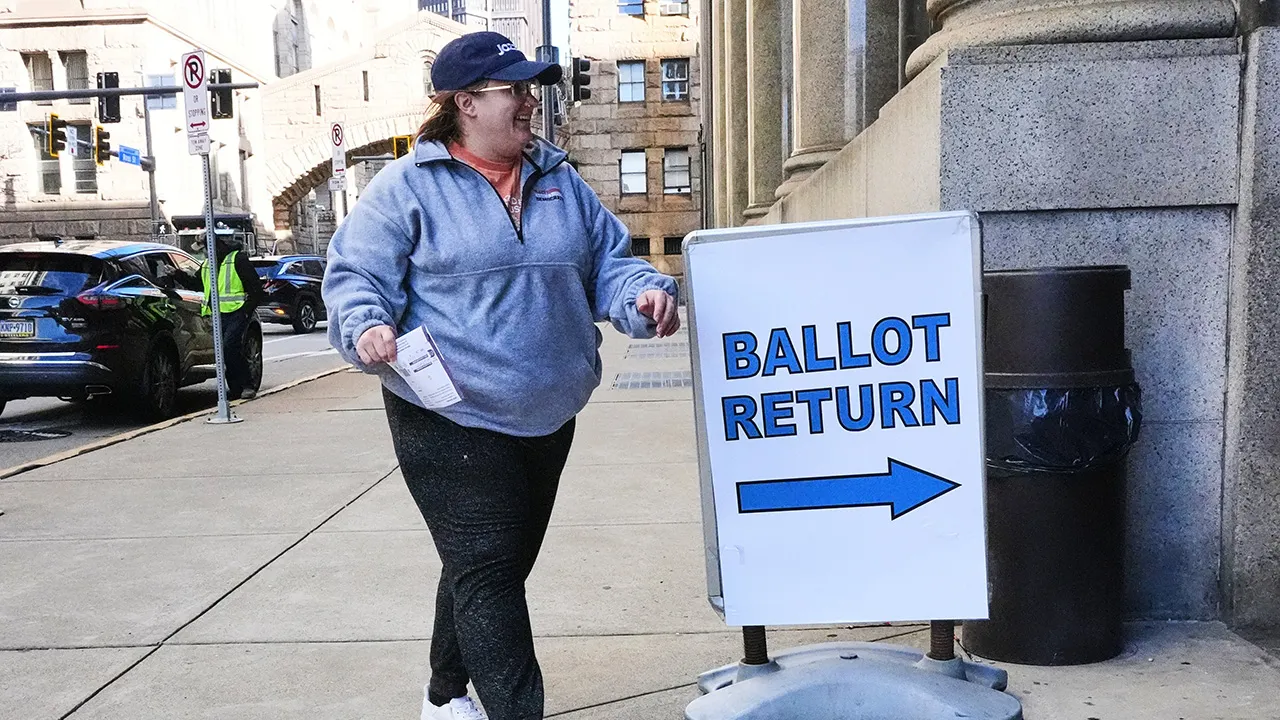Northeast
Member of trans vegan cult pleads not guilty to killing Border Patrol agent in first hearing on murder charge

Procession for slain U.S. Border Patrol Agent David Maland
The body of Maland, who was killed in a shooting 20 miles south of the Canadian border, is moved to a funeral home in Burlington while a long line of police vehicles follow behind the hearse and Vermont State Troopers stand at attention.
NEWYou can now listen to Fox News articles!
A woman accused of shooting and killing a U.S. Border Patrol agent pleaded not guilty to murder and other charges Friday, marking her first court appearance since prosecutors said they would seek the death penalty for the suspect linked to a transgender vegan cult that has been tied to multiple killings across the country.
Teresa Youngblut, 21, pleaded not guilty in federal court in Burlington, Vermont, to the shooting, which happened during a traffic stop in January. The superseding indictment, returned by a federal grand jury last month, charged Youngblut with the murder of Agent David Maland, the assault of two other agents with a deadly weapon and related gun offenses.
Attorney General Pamela Bondi has formally authorized the pursuit of capital punishment in the case, and the acting U.S. attorney for the District of Vermont has filed a notice of intent to seek the death penalty, the agency said last month.
SUSPECT IN BORDER AGENT KILLING FACES DEATH PENALTY: DOJ
Teresa Youngblut in the office at the Newport City Inn Jan. 14, 2025, in Newport, Vt. (Newport City Inn photograph via AP)
Investigators have linked Youngblut to the “Zizians,” a self-described vegan, anti-government, transgender rights collective that authorities say has been tied to six killings across three states, The Associated Press reported.
TEXAS BORDER PATROL SHOOTER DETAILS REMAIN SCANT AS VIOLENCE AGAINST ICE, CBP AGENTS SURGES
During the Jan. 20 traffic stop along Interstate 91 in Coventry, Vermont, prosecutors allege that Youngblut exited a Toyota Prius with companion Felix Bauckholt before shooting at the law enforcement officers without warning, killing Maland and endangering two other Border Patrol agents.
An agent returned fire, and Bauckholt was killed and Youngblut was wounded.

U.S. Border Patrol Agent David Maland is recognized with military honors before his burial at Fort Snelling National Cemetery in Minneapolis Feb. 22, 2025. (AP Photo/Abbie Parr)
During the court appearance Friday, Youngblut’s hair was styled in braided pigtails. Youngblut wore an oversized sweatshirt, a mask and baggy pants, according to the AP. Youngblut’s parents watched the defendant enter the courtroom, where Youngblut’s mother smiled and waved as Youngblut was handcuffed and escorted out, the AP reported.
Following Youngblut’s not guilty plea, Judge Christina Reiss turned to matters of pretrial discovery. The defense wanted to make sure that the accused killer’s medical records remain confidential, noting they are extensive. Reiss affirmed that medical and mental health records are considered privileged material, the AP reported.
Youngblut, who is being held in federal custody, also has new legal representation. The defense is being led by Christine Lehmann, a senior capital attorney with the Louisiana Crisis Assistance Center, according to NBC5.
4 ARRESTED IN ALLEGED BORDER PATROL OPERATION SABOTAGE ATTEMPT NEAR LA AS ATTACKS ON IMMIGRATION AGENTS SURGE

This undated image, courtesy of Joan Maland, shows U.S. Border Patrol Agent David Maland, who was killed Monday, Jan. 20, 2025, after a traffic stop in Vermont. (David Maland/Joan Maland via AP)
A status conference originally scheduled for Nov. 5 has also been postponed, and no new date has been scheduled yet, NBC5 reported.
The U.S. Attorney’s Office and Lehmann and Steven Barth, who has been representing Youngblut, did not immediately respond to Fox News Digital’s request for comment.
Fox News Digital’s Sarah Rumpf-Whitten contributed to this report.
Read the full article from Here

Connecticut
CT election night recap: Democrats win big, mirroring national results

Democrats won big in Tuesday’s municipal elections in Connecticut, holding on to mayoral offices in Stamford, New Haven and Danbury and knocking out incumbent Republicans in Ansonia and Stratford, according to unofficial vote tallies.
The results came amid other Democratic wins elsewhere in the country.
In New York City’s closely-watched mayor’s race, Zohran Mamdani beat former New York Gov. Andrew Cuomo, who ran as an independent, and Republican Curtis Sliwa. In California, Democrats passed a gerrymandering proposition that would allow them to carve out additional blue seats.
Here’s a look at where some Connecticut’s key municipal races stand Wednesday morning:
Democratic incumbents in Stamford, Danbury and New Haven each fended off Republican mayoral challengers Tuesday night.
Voters also granted a second term to Danbury Mayor Roberto Alves, who scored a win over Republican Emile G Buzaid with 59.06% of the vote.
In New Haven, incumbent Mayor Justin Elicker handily defeated Republican Steven Orosco, a former MMA fighter, with 77.43% of the vote. The win continues Democrats’ control of the city that dates to the Eisenhower administration.
A handful of races remained either too close to call Wednesday morning or lacked results.
In Easton, the secretary of the state’s unofficial results showed Republican Dan Lent leading Democrat Nicholas D’Addario by just six votes in the race for the first selectman’s office.
In East Hartford, where Republican Salema Davis and Connor Martin are vying for the mayor’s office, no results have been reported, according to the secretary of the state.
Tuesday night saw a few upsets with incumbents knocked from their seats.
In Ansonia, Republican Mayor David S. Cassetti lost to Democrat Frank Tyszka, who secured 57.96% of the vote.
In Stratford, incumbent Republican Laura R. Hoydick lost to Democrat David Chess.
Neighboring Milford also saw a Republican incumbent defeated by a Democrat, with voters backing Rich Smith over the incumbent, Tony Giannattasio.
Maine
More Maine school districts adopt Trump transgender policy

The town of Richmond was trying to decide if it should amend a school policy to prohibit transgender girls from competing in girls sports. Among public commenters, debate was just about evenly split: should they follow a state law that allows them to compete, or an executive order signed by President Donald Trump that doesn’t?
The school board in this small Sagadahoc County town ultimately voted 3-2 in mid-October to align its policies with the executive order, becoming at least the eighth Maine district to do so. They’ve gone against the advice of the law firm that provides counsel to most of the state’s districts. Some, including those in Augusta and Kennebunk, have discussed, but ultimately declined, to adopt those changes.
Ever since Trump signed the order shortly after retaking office, his administration has threatened to pull funding from schools that allow students assigned male at birth to compete on girls sports teams in an interpretation of Title IX, the federal law that prohibits sex-based discrimination in education. Maine’s governor challenged Trump on the issue and pledged to see him in court, which led to the the Justice Department filing a lawsuit against the state. That case is set to go to trial next April.
But districts like Richmond aren’t waiting for legal clarity, and the conservative Maine Policy Institute and the Maine Chapter of Parents’ Rights in Education are working directly with others that want to make that same leap. Their calculation is that state officials won’t challenge them.
That may not be true.
The state agency responsible for enforcing the Human Rights Act could already be doing so, its director acknowledged, although all complaints are confidential until their investigations are complete.
Daniel Farbman, an associate professor at Boston College Law School, said executive orders like this one are not laws themselves, just proposed interpretations of existing statute. A change to Title IX could be decided by the courts, but in the meantime, he said, state law still applies.
In the meantime, a group of Maine Republicans are asking voters to sign a ballot initiative that would change state law to align with the Trump administration’s order. Petitioners need to gather 68,000 signatures from registered voters to put the initiative on next year’s ballot and were out at polling locations on Tuesday to kick off that process.
STATE ENFORCEMENT
Maine has required schools to allow students to participate in extracurricular activities without discrimination on the basis of gender identity since 2021. The law is enforced by the Maine Human Rights Commission, a quasi-state agency that oversees complaints of discrimination on the basis of race, sex, gender identity and religion in areas like employment and education.
The commission enforces the law through investigating submitted complaints, and it’s unclear if the districts that have changed their Title IX policies have faced any. All submissions to the Human Rights Commission remain completely confidential until they’re resolved, Director Kit Thomson Crossman said in a recent interview. The agency has two years from the filing of a complaint to complete its investigation, and it often does take that full time.
“So if a complaint was filed today, I might not be able to tell you anything about it until October of 2027,” Thomson Crossman said.
An annual report released last week shows the commission is expecting to get more complaints this year because districts have adopted the federal government’s “as-yet untested interpretation of Title IX.”
The agency is capable of initiating investigations of its own, but those also remain confidential until resolved, and Thomson Crossman said because the agency’s small staff handles between 600 and 800 complaints annually, it’s rare.
But, this “would certainly be a situation where we would be considering that.”
And even if the commission hasn’t initiated any complaints, it doesn’t mean that state laws don’t still apply.
“As far as we’re concerned, the Human Rights Act still requires schools to provide a safe education environment for all of their students, cisgender or transgender,” Thomson Crossman said. “Students are required to be able to play sports on the team that corresponds with their gender identity. They’re required to be able to use sex-segregated facilities that correspond with their gender identity.”
The law firm Drummond Woodsum, which provides legal counsel to the majority of Maine districts, has advised school boards to hold off on making changes to transgender student policies and keep following state law.
“Our advice has been, let’s see what the court does with this issue, and then if we need to revise policies to reflect new guidance from the Supreme Court, we can do that,” said attorney Isabel Eckman, who leads the firm’s School Law Group.
MAINE EDUCATION INITIATIVE
The Maine Education Initiative, a project run by the right-wing Maine Policy Institute and in partnership with the Maine chapter of Parents’ Rights in Education, has been leading the effort. The initiative provides districts with model policies, letters, workshops and other resources.
Jacob Posik, a spokesperson for the Maine Policy Institute, said the organization has worked with about a dozen districts, including all of those that have adopted the Title IX changes.
Allen Sarvinas, director of the parents’ rights chapter in Maine, told the Richmond school board — seizing on a comment Thomson Crossman made to the Bangor Daily News in August — that the Human Rights Commission did not plan to take independent action against any school district for changing its policies.
Posik said it’s proof the commission “does not intend to go after schools that adopt their own Title IX policies.”
Thomson Crossman said those seem like willful misinterpretations.
“Just because we, in August, had no plans to file a commission-initiated complaint against these school districts doesn’t mean that we don’t expect the school districts to still comply with the law,” they said. “And it doesn’t mean that we would never take action.”
Posik justified the approach by saying “federal law supersedes state law” and said that all Maine school districts “are operating in a legal gray area currently” until the dispute is resolved.
Farbman, from Boston College, said it’s true that a federal change to Title IX would supersede state law, as established by the Supremacy Clause of the Constitution. But the executive order isn’t that: it does not preempt state law, he said, it’s just an interpretation not yet tested by the courts.
He said this has been a consequence of Trump’s flurry of executive orders: “placing things in question that might not otherwise be in question.” He pointed to an executive order about birthright citizenship, which he said straightforwardly violated the Constitution.
Farbman said the orders create confusion as people believe them to be federal law and attempt to comply either because they agree with the interpretation, or because they’re afraid of the consequences if they don’t, something he described as a kind of chilling effect.
Eckman, with Drummond Woodsum, offered a similar read of the situation: the president cannot change statute via executive order, she said, but it has created confusion for her clients.
“It’s a really unfortunate situation where it’s put public school districts in the crosshairs of a much larger kind of culture war,” she said. “I do think our public school clients are really wanting to figure out how to follow the law, by and large.”
In addition to the Justice Department’s lawsuit against Maine, she said there are two cases on the U.S. Supreme Court’s docket next year could provide official legal clarity on that question.
PLAYING OUT IN SMALL TOWNS

In Richmond, school board member Liana Knight invoked that advice in October, during one of two public workshops on the policy change.
“An executive order is not a law. It’s a suggestion for how a law should be interpreted,” she said. “I am struck that we have reached out to our lawyer, I think at least twice about this, and both times the lawyer has recommended that we just wait.”
Board Chair Amanda McDaniel told the Press Herald she respects the advice of attorneys but she isn’t personally concerned about the conflict with state law.
“We’re put in these positions to make decisions on behalf of the community,” she said. “We can take all advice into account and still move forward with how we feel things need to be done.”
School districts based in Hodgdon, Jay, Sullivan, Danforth, Turner, Baileyville, Wales have made the same calculation.
All of them represent small, conservative-leaning communities, most with only a few hundred students. It’s unlikely any have transgender student athletes competing on girls sports teams since the Justice Department’s lawsuit cites only three in the entire state.
In Richmond, those who opposed the policy changes, including several students and teachers, described it as a solution without a problem, argued it unnecessarily exposed the district to litigation, and said the changes targeted a very small and vulnerable student population. Supporters, many who identified themselves as grandparents, invoked fairness in girls sports.
“If we push this forward now, it means we are taking initiative to take rights away from one of our most vulnerable populations,” Knight said. She was one of two votes against the policy change.
McDaniel said in the end it came down to the fact that the majority of the board members felt it was the right thing to do.
In Danforth-based MSAD 14, superintendent Margaret White resigned after the board voted unanimously to change its policies, the Bangor Daily News reported.
In Jay-based RSU 73, school board member Bryan Riley quit in July, citing health issues but also describing the board’s recent decision as “unnecessary and reckless.”
“Fishing for a legal opinion that matches one’s personal beliefs is a good way to waste taxpayer money and erode the trust that exists between faculty and the board,” Riley wrote in his resignation letter.
Massachusetts
Massachusetts is ‘prepared’ for National Guard deployment, AG Andrea Campbell says

AG Andrea Campbell says Massachusetts is ready if the National Guard is deployed to the Bay State, adding that her office is “drafting paperwork” that she hopes it never has to file against President Donald Trump.
The attorney general’s comments mark the firmest stance yet from a Bay State official on what kind of coordination or preparations are being made in the case Trump tries to deploy troops in Massachusetts.
Trump has deployed National Guard units to cities he argues are dealing with high crime or are epicenters of federal immigration activity, even as governors and mayors have largely voiced opposition to their arrival.
“We are prepared if they were to come,” Campbell said on GBH’s Boston Public Radio on Tuesday. “Of course, I hope they don’t, because the narrative they’re suggesting is that they would come here to promote public safety, and we are doing just fine.
“If anything,” the AG continued, “we’re seeing in other communities across the country is that they’re eroding public safety and trust between law enforcement and the community. In addition to that, they’re perpetuating fear.”
Campbell said her office is engaging with the National Guard, Gov. Maura Healey’s office, the state Legislature, law enforcement, and “every stakeholder” available over how the state would respond to a potential deployment.
The AG added that she’s personally spoken with her counterparts in California, Illinois and Oregon, states where Trump has threatened to deploy the National Guard to combat what he describes as lawlessness.
Trump continues to face legal challenges in areas where he has looked to deploy troops.
Courts in Tennessee and West Virginia heard arguments Monday challenging the deployment of their states’ National Guard troops to patrol the streets of Memphis and Washington, D.C.
Since their arrival on Oct. 10, National Guard troops have been patrolling neighborhoods and commercial areas of Memphis, wearing fatigues and protective vests that say “military police.” Officials have said Guard members, who are armed, have no arrest power.
West Virginia is among several states that sent troops to Washington, D.C., to support Trump’s crime-fighting efforts. Last month, a West Virginia judge asked attorneys for the state to address whether Gov. Patrick Morrisey’s deployment of up to 300 Guard members to the nation’s capital in August was legal.
The Bay State AG’s Office has filed 41 complaints against the Trump administration since the president regained office in January. Campbell made clear that another may be coming if Trump tries to deploy troops here.
“Any time you file a lawsuit, it takes a lot of human capital resources and work,” the AG said. “And frankly, you have to be prepared beforehand, so we hope we never have to file anything.”
Healey said last month that sending the National Guard to major U.S. cities is a “waste of resources,” but the first-term Democrat declined to say if she was coordinating with any local officials or preparing any action in case Trump attempted to conduct a deployment in Massachusetts.
Bay State Congressman Jim McGovern told the Herald last month that he had spoken to the Healey administration about a possible National Guard deployment.
Campbell said troops are designed to handle a “major flood, a major emergency” in the state. She added that she doesn’t know how equipped the National Guard is to accomplish what Trump wants it to.
“They’re not necessarily trained to show up in the city of Boston,” she said, “or the municipalities here in Massachusetts, to promote public safety, to investigate crimes, to respond appropriately.”
The Associated Press contributed to this report.
-

 Milwaukee, WI1 week ago
Milwaukee, WI1 week agoLongtime anchor Shannon Sims is leaving Milwaukee’s WTMJ-TV (Channel 4)
-

 News1 week ago
News1 week agoWith food stamps set to dry up Nov. 1, SNAP recipients say they fear what’s next
-

 Alabama1 week ago
Alabama1 week agoHow did former Alabama basketball star Mark Sears do in NBA debut with Milwaukee Bucks?
-

 Culture1 week ago
Culture1 week agoVideo: Tyler Mitchell Breaks Down Three Photos From His New Book
-

 News1 week ago
News1 week ago1 dead, 6 injured in shooting at Lincoln University homecoming festivities
-

 Culture6 days ago
Culture6 days agoVideo: Dissecting Three Stephen King Adaptations
-

 Seattle, WA3 days ago
Seattle, WA3 days agoESPN scoop adds another intriguing name to Seahawks chatter before NFL trade deadline
-

 Seattle, WA1 week ago
Seattle, WA1 week agoFOX 13’s Aaron Levine wins back-to-back Jeopardy! episodes






















